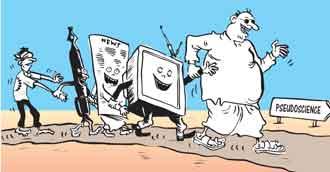Reply To:
Name - Reply Comment
 Sri Lankans are gullible to ‘pseudoscience’. Lawmakers and ambitious people are aware of this existence and use it to their advantage. The last time people believed in such nonsense was when a doctor in Kurunegala was accused of performing illegal sterilisation surgeries on females. Several complaints were lodged against this doctor by a number of mothers. They claimed that after they were treated by this doctor, they experienced complications in conceiving. Just the other day this doctor was acquitted of all charges levelled against him when the Kurunegala Magistrate’s Court maintained that there wasn’t sufficient evidence to proceed with the case his name was associated with. This doctor plans to obtain legal assistance to fight those who caused injustices to him and his family and to ensure that such acts don’t happen in the future.
Sri Lankans are gullible to ‘pseudoscience’. Lawmakers and ambitious people are aware of this existence and use it to their advantage. The last time people believed in such nonsense was when a doctor in Kurunegala was accused of performing illegal sterilisation surgeries on females. Several complaints were lodged against this doctor by a number of mothers. They claimed that after they were treated by this doctor, they experienced complications in conceiving. Just the other day this doctor was acquitted of all charges levelled against him when the Kurunegala Magistrate’s Court maintained that there wasn’t sufficient evidence to proceed with the case his name was associated with. This doctor plans to obtain legal assistance to fight those who caused injustices to him and his family and to ensure that such acts don’t happen in the future.
When the accusations were made against the doctor, initially, Kurunegala irrupted in anger. Hatred was spread faster than a forest fire. Racial tensions surged. Individuals who wished to harm the fabric of brotherhood between different communities had achieved their goal of causing disharmony in society. Most importantly, from a very negative perspective, people were very cleverly moved away from scientific thinking.
This was not the first time when the people of this island chose to believe in unsubstantiated stories. During the Covid-19 pandemic, when employees at a leading fish stall in the outskirts of Colombo contracted the virus, customers chose to believe in a cooked-up story that fish shouldn’t be purchased from this stall because the fish could be carrying the virus. All efforts taken by medical practitioners to rubbish this story that was spreading proved futile. Rumours won the day against science-based reasoning. The whole episode at this fish stall served to give all of us a stern reminder that ‘we are living in a vulnerable nation called Sri Lanka’.
Then we also have a past where Muslim business eateries were targeted with accusations being made that the majority Sinhalese who dined there were fed with kottu roti that contained certain concoctions; which resulted in infertility if consumed. These incidents were carefully manipulated for the Sinhalese customer to shun Muslim eateries; which in most areas serve the best kottu roti; a chopped flatbread mixed and mashed together with chicken and vegetables. Someone ambitious out there was the mastermind of slowly working on causing religious tensions and how gullible the majority race of this country was to ‘swallow the bait’.
Indian-born American entrepreneur and investor Naval Ravikant (co-founder, chairman and former Chief Executive Officer of AngelList) maintains that nothing should be believed before research is done and you’re thoroughly convinced that whatever knowledge that has gone into a product or service is available to everyone in this world. The problem with pseudoscience is that this knowledge is available only to an exclusive club; whose members and followers don’t like the work they believe in to be investigated.
Most of us are aware that money can be minted through the sale of narcotics, weapons and most importantly all products and services pertaining to the business of wellbeing; example yoga and meditation. The subject of wellbeing can be discussed at any forum because it generates money the proper or legal way. Then of late we saw the emergence of a prophet, an Avalokiteshvara (An enlightened person practicing Buddhism) and even the emergence of a physician practicing alternative medicine who sold a syrup that promised to be a remedy in the fight against Covid. Such notorious people, with no power or real ability, seem to have the skill to go through the filtering mechanism of people of this country. We can learn from the Kurunegala doctor’s story and change our thinking, so that we allow logic, reasoning and the eyewitness to be vital aspects of critical thinking, something that Sri Lankans lack alarmingly!